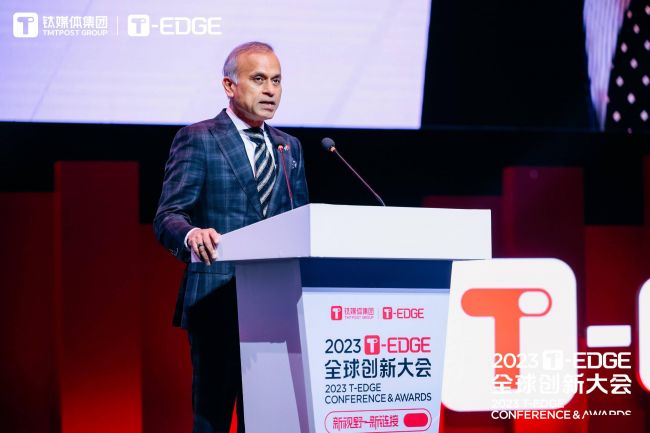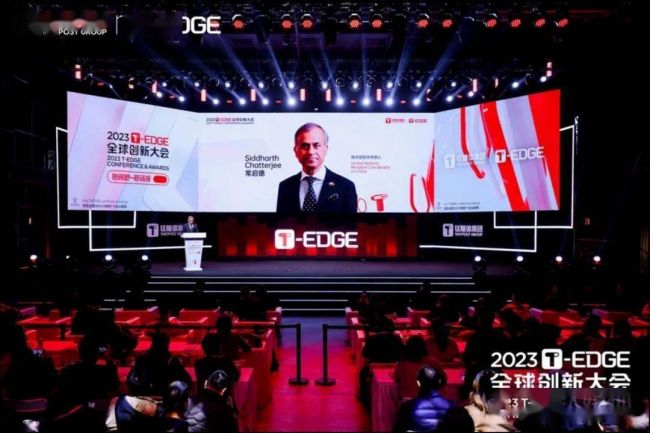
12月1日上午,2023T-EDGE全球创新大会上,联合国驻华协调员常启德致辞
作为中国科技与商业创新领域备受瞩目的国际交流盛典,2023T-EDGE全球创新大会与全球创新者一同见证国际化浪潮下,全球商业创新思路与业务增长逻辑的爆炸式变革。
12月1日上午,联合国驻华协调员,Siddharth Chatterjee 常启德先生开场致辞,致辞《2023 T-EDGE Conference》英文全文已经发布到了联合国官方网站上。

常启德认为,T-EDGE全球大会将政界、学界、创新创业人士齐聚一堂,涵盖AI、技术、创新等各个领域,这些领域都是加速实现可持续发展目标(SDGs)的关键,也将成为促进全球创新的关键路径和数字路径。
常启德指出,当今我们经历了很多地缘政治的变化和创新的变化,在新一轮科技变革和产业变革浪潮中,各国经济联系日益紧密,创新和资源流动速度空前加快。正如联合国秘书长安东尼奥·古特雷斯(Antonio Gutierrez)所说,只有加强全球合作才能够更好地应对我们人类面临的共同的挑战,才能够达成我们的可持续发展目标。
“我们也注意到中国在继续提高其技术和创新能力,积极参与经济活动,并与其他国家在这些领域开展合作”,他说道。
常启德指出,数字化的发展创造了诸多机会,也带来了很多的挑战。无论是在人工智能(AI)还是大数据等领域,都需要更深入、更广泛的讨论,以探索技术、经济和产业转型的潜力,同时就这些变化可能带来的相关风险进行持续对话。
人工智能作为一种新兴技术,正在迅速推进,并改变生产、消费过程,也在更广泛地影响着社会。人工智能的最新形式——生成性人工智能(AIGC)的兴起,已获得了前所未有的关注度、发展速度和覆盖范围。如果负责任地加以利用,人工智能有可能成为加速可持续发展目标进展的关键工具,然而,我们必须确保合乎道德和负责任地开发和部署人工智能,以维护和平与发展。
此外,他还强调,AI的发展不能带走人们体面就业的机会,不能够造成任何的性别歧视,也不能威胁到人类的平等,而是让它能够重塑我们团结的未来。AI作为全球未来的发展方向之一,需要世界各国共享机会、共享共识,从而能够应对共同的挑战。同时,要有效治理AI相关的问题,形成一种共识和互联,需要一个高级别的顾问委员会进行分析和研究,指导AI的治理。
联合国秘书长呼吁制定《全球数字契约》并就此达成一致意见,有望取得进一步进展,该契约将在2024年9月举行的未来峰会上得到会员国的同意。该契约将概述共享原则,为所有人创造一个开放、自由和安全的数字未来,并将涵盖与人工智能、互联网碎片化和数字连接相关的问题。此外,秘书长还呼吁建立一个人工智能高级别咨询机构,对人工智能的国际治理进行分析并提出建议。
常启德呼吁,可持续发展目标需要我们大家去打破国家和人民之间的壁垒和障碍。他鼓励今天所有的参会者都能够去探索如何能够去实现可持续发展目标,以及一种可持续的方式,让这些技术和创新最终能够铺平道路,推进人类的发展进步。技术和创新需要引起关注,实践和可持续发展目标保持一致才能够实现可持续的明天,这是我们每个人在全球各地的目标。常启德表示,联合国也将和大家共同携手,取得可持续发展目标的进步。

以下是Siddharth Chatterjee 常启德先生在2023 T-EDGE上发表的英文致辞全文:
Ms Hejuan Zhao, the CEO of TMT post and I wish to commend you for undertaking this important initiative,
Ambassador Signe Brudeset,a great believer in multilateralism and a strong ally of the UN family,
Ladies and gentlemen,
Greetings and Good morning.
I am delighted to be here to address the 2023 T-EDGE Conference.
The T-EDGE conference brings together representatives from governments, international organizations, academia and the business sector, to discuss issues related to the digital economy, technology and innovation, all of which are critical to accelerating the achievement of the Sustainable Development Goals (SDGs).
Enhancing international cooperation and global partnerships is also essential for achieving the SDGs.
Today, as the new wave of technological change and industrial transformation progresses, innovation and resources move faster than ever as economic ties between countries become ever closer.
Just as the Secretary-General of the United Nations, António Guterres, has emphasized, it is only through strengthened international cooperation that we can effectively address our common challenges and achieve sustainable development.
At the same time, we have observed China continue to increase its capacities in technology and innovation while actively engaging in economic activity and cooperation with other countries in these areas.
However, while the digital economy and innovation create new opportunities, such progress also presents new challenges for the world to consider. Whether in areas such as artificial intelligence (AI) or big data, we need more in-depth, extensive discussions to explore the potential for technological, economic and industrial transformations, along with continued dialogue on the associated risks these changes might bring.
For example, AI, as an emerging technology, is rapidly advancing and shifting production and consumption processes, impacting society more broadly. The rise of the newest form of AI, generative AI, has seen unprecedented attention, speed and reach. AI, if harnessed responsibly, has the potential to be a pivotal tool to accelerate progress on the SDGs,
However, we must ensure the ethical and responsible development and deployment of AI to safeguard peace and security, human rights and development.
Fears are rising, particularly with generative AI, that AI tools and increased automation will put more people out of decent work, posing social and economic challenges. Similarly, inaction on gender biases in science, technology, engineering and mathematics fields threatens to perpetuate inequalities within the algorithms that will shape our future.
Here, with AI as a common global interest, the case for cooperation is perhaps most apparent.
This is why the Bletchley Declaration, agreed upon by 28 countries, including the US, China, UK and EU, is an important achievement. This agreement established a shared understanding of the opportunities and risks posed by AI and the need for governments to work together to meet the most significant challenges.
Further progress will hopefully be achieved through the development and agreement of a Global Digital Compact, which was called for by the UN Secretary-General and will be agreed to by Member States at the Summit of the Future in September 2024. This compact will outline shared principles for an open, free and secure digital future for all and will cover issues related to AI, internet fragmentation and digital connectivity. In addition, the Secretary-General has called for the establishment of a High-Level Advisory Body on Artificial Intelligence to undertake analysis and advance recommendations for the international governance of AI.
We encourage all attendees at this Conference to follow these developments closely.
I also note the continued trend of many Chinese companies to expand their operations internationally. Such companies require opportunities such as those presented by this conference to facilitate more learning and the sharing of best practices.
Ladies and gentlemen,
The SDGs require an all-of-society approach that breaks down the barriers between nations and people.
That is why I would encourage all attendees at this conference to explore how they can best support the achievement of the SDGs.
Whether it is through creating breakthroughs for human well-being achieved through technology and innovation, more efforts to raise awareness and inspire global dialogue on the challenges we face or aligning your business operations more closely with the SDGs, all of us can work to achieve a better and more sustainable future, as well as peace and prosperity for everyone, everywhere.
Here, the UN in China stands ready to work with you all as we mobilize further efforts for a new phase of accelerated progress on the SDGs.
Again, I thank the TMTPost Media Group for hosting this Conference and wish it every success.
Thank you.
以下是该致辞的中文翻译版:
钛媒体首席执行官赵何娟女士,我谨向您开展这一重要举措表示赞赏,白思娜大使是多边主义的坚定信仰者和联合国大家庭的坚定盟友。
女士们、先生们,
早上好。
我很高兴能在2023年的T-EDGE会议上发言。
T-EDGE会议汇集了来自政府、国际组织、学术界和商业部门的代表,讨论与数字经济、技术和创新有关的问题,所有这些都是加速实现可持续发展目标(SDGs)的关键。
加强国际合作和全球伙伴关系对于实现可持续发展目标至关重要。在新一轮科技变革和产业变革浪潮中,各国经济联系日益紧密,创新和资源流动速度空前加快。正如联合国秘书长安东尼奥·古特雷斯所强调的那样,只有通过加强国际合作,我们才能有效应对我们的共同挑战,实现可持续发展。与此同时,我们注意到中国在继续提高其技术和创新能力,积极参与经济活动,并与其他国家在这些领域开展合作。
然而,虽然数字经济和创新创造了新的机遇,但这种进步也给世界带来了新的挑战。无论是在人工智能(AI)还是大数据等领域,我们都需要更深入、更广泛的讨论,以探索技术、经济和产业转型的潜力,同时就这些变化可能带来的相关风险进行持续对话。
例如,人工智能作为一种新兴技术,正在迅速推进,并改变生产、消费过程,在更广泛地影响着社会。人工智能的最新形式——生成性人工智能的兴起,已经获得了前所未有的关注度、发展速度和覆盖范围。如果负责任地加以利用,人工智能有可能成为加速可持续发展目标进展的关键工具,然而,我们必须确保合乎道德和负责任地开发和部署人工智能,以维护和平、安全、人权和发展。
人们越来越担心人工智能工具和自动化程度的提高会让更多人失去体面的工作,从而带来社会和经济挑战,特别是在生成型人工智能方面。类似地,对科学、技术、工程和数学领域的性别偏见不作为有可能使决定我们未来的算法中的不平等现象永久化。在这里,人工智能是全球共同的利益,合作的理由也许是最明显的,这就是为什么由包括美国、中国、英国和欧盟在内的28个国家达成的《布莱切利宣言》是一项重要成就。该协议建立了对人工智能带来的机遇和风险的共同理解,以及政府合作应对最重大挑战的必要性。
联合国秘书长呼吁制定《全球数字契约》并就此达成一致意见,有望取得进一步进展,该契约将在2024年9月举行的未来峰会上得到会员国的同意。该契约将概述共享原则,为所有人创造一个开放、自由和安全的数字未来,并将涵盖与人工智能、互联网碎片化和数字连接相关的问题。此外,秘书长还呼吁建立一个人工智能高级别咨询机构,对人工智能的国际治理进行分析并提出建议。
我们鼓励所有与会者密切关注这些事态发展。我也注意到许多中国公司继续在国际上扩张业务的趋势,这些公司需要机会,以促进更多的学习和分享。女士们、先生们,可持续发展目标需要一个全社会的努力,打破国家和人民之间的障碍。因此,我鼓励本次会议的所有与会者探索如何更好地支持可持续发展目标的实现。
无论是通过技术和创新实现人类福祉的突破,还是通过更多的努力来提高人们的意识,激发关于我们所面临的挑战的全球对话,还是使您的业务运营更紧密地与可持续发展目标保持一致,我们所有人都可以努力实现一个更美好和更可持续的未来,以及世界各地每个人的和平与繁荣。
在此,联合国驻华代表处愿与大家共同努力,加快推进可持续发展目标进入新阶段。
我再次感谢钛媒体主办这次会议,并预祝会议取得圆满成功。
谢谢!




访谈
更多护航视频监控网络安全 做物联网安全的守护者 ——专访天防安全总经理段伟恒
在万物互联时代,网络安全的重要性日益凸显,尤其在快速发展的城市建设中,搭建的巨大物联网络对其安全保障…
做行业赋能者 HID迎接数字化浪潮新机遇 破解新挑战
今年3月份,全球可信身份解决方案提供商HID发布了最新的《安防行业现状报告》(以下简称“报告”),该报告…
数字化浪潮下,安防厂商如何满足行业客户的定制化需求?
回顾近两年,受疫情因素影响,包括安防在内的诸多行业领域都遭受了来自市场 “不确定性”因素的冲击,市场…